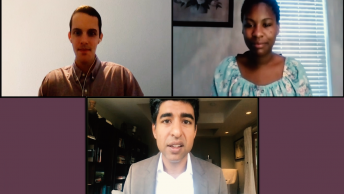Dear Expecting More readers,
In the United States, racism remains alive and well, not only among overt bigots, but within thought patterns and structures of revered institutions, including the medical establishment. Few facts make this more apparent than the shared experience of Black mothers, who are consistently three to four times more likely to die in childbirth than white mothers, regardless of their education or income.
The truth about racism in my profession can feel jarring. And the dissonance is precisely why it is so important we absorb the teachings of Black Maternal Health Week.
Learning from Black mothers and Black leaders has helped me reconsider some of my own practices as an obstetrician. I’ve come to understand that in medicine, our baseline prejudice is compounded by the ways we are trained. Every medical case study identifies the patient by race so that we learn to associate a singular aspect of their identity with their underlying condition. Diabetes is more common in African Americans. So is asthma. The tacit fallacy becomes that blackness is somehow related to disease. But as Dr. Joia Crear-Perry, founder of the Black Birth Equity Collaborative, states plainly, “Race isn’t a risk factor in Maternal Health. Racism is.”
Rather than identifying and mitigating biases, in medicine we reinforce them. In a system finely tuned to the ways white people present with illness, health care workers can become conditioned to dismiss the constellation of subjective signals–anemia, shortness of breath, pain–all of which may indicate a Black person in front of us needs urgent help. In these cases, the line between clinical intuition and racism evaporates. We respond too late, with potentially terrible consequences.
Growing evidence demonstrates the dismissal is not anecdotal but widespread. When Black women express pain, clinicians respond more slowly than they do for white women. A 2016 study published by the National Academies of Sciences found that nearly half of surveyed white medical students and residents believed black people have thicker skin than white people–not metaphorically, literally.
Right now, a novel and deadly coronavirus has put the medical system on its heels. We are facing wrenching decisions about who to treat with limited lifesaving equipment, ones that are understandably hard to trust when those who are least likely to be saved are the same people the health system was least effective at saving in the first place. We are also holding conflicting truths: the need to physically protect patients, staff and the wider community by limiting visitors, and also the need to socially protect those most vulnerable to racism by making sure they have trusted advocates by their side.
In this context, racism will become deadlier than ever unless we possess the will to lead differently. This means not only naming racism and its deadly impacts, but reforming the very structures that are currently driving it. Since being founded in 2018, Black Maternal Health Week has breached siloes and compelled professional societies to make new spaces for addressing racial equity. Last year Congress created a Black Maternal Health Caucus, and this year nearly every Democratic presidential candidate had a platform to address racial equity in childbirth.
Expecting More is proud to support this week of awareness, activism, and community building. And we are committed to amplifying the voices of those whose lived experience and wisdom can help ensure we do better.
Sincerely,
Neel Shah



